|
High Street
Edenbridge
https://whatpub.com/white-horse-inn
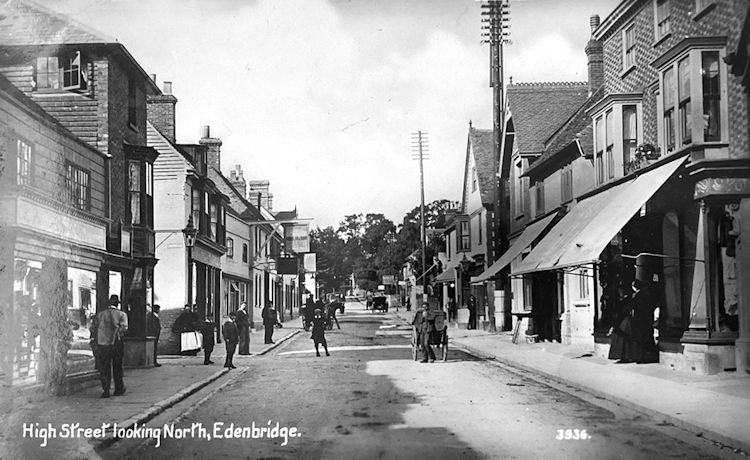
Above postcard, circa 1910, kindly sent by Rory Kehoe. Looking north up
Edenbridge High Street, with the pub on the left-hand side of the road. |
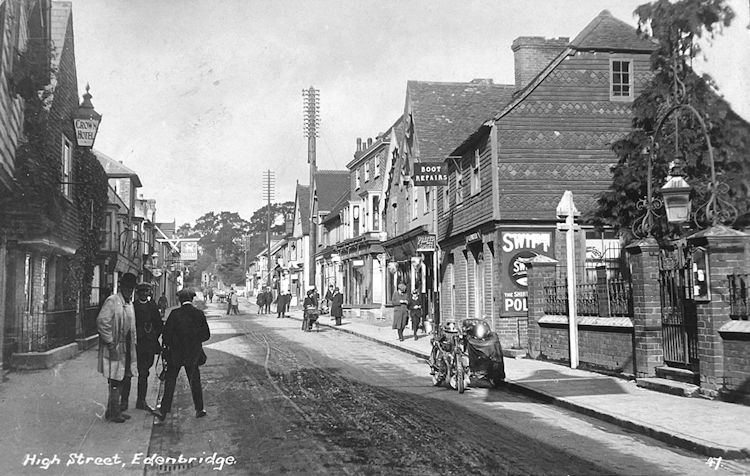
Above postcard, circa 1914, kindly sent by Rory Kehoe. A view,
looking north up the High Street, with the swing sign of the pub on the
left-hand side. In the extreme left foreground is part of the "Crown
Hotel." To capture this image, the photographer must have been
standing directly underneath the "Crown's"
famous inn sign, which straddles the High Street. |
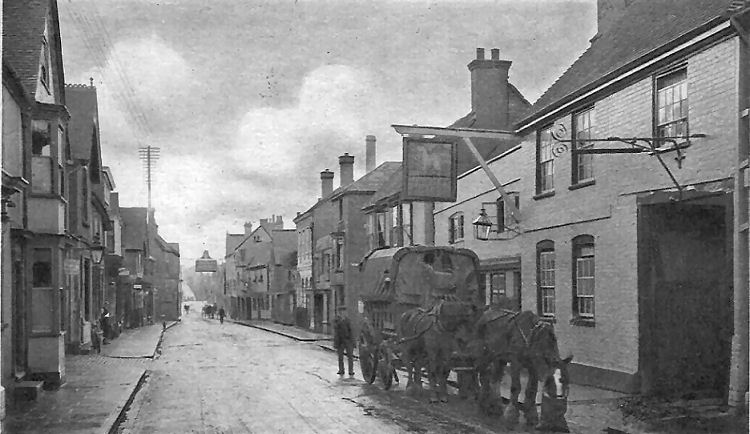
Above photo, 1917, kindly sent by Rory Kehoe. |
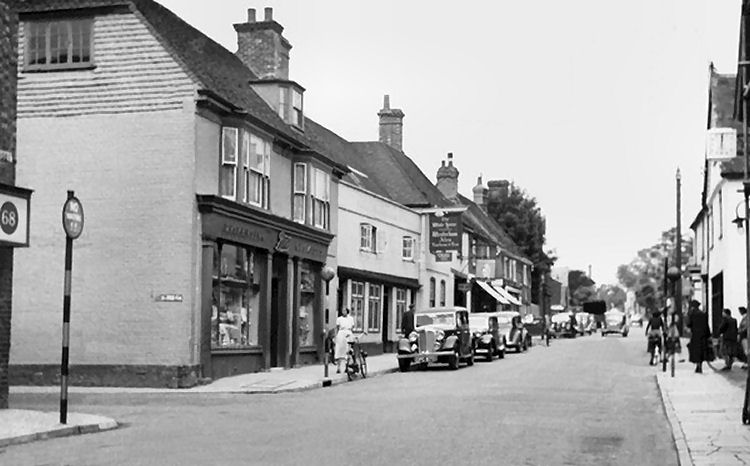
Above postcard 1955. |
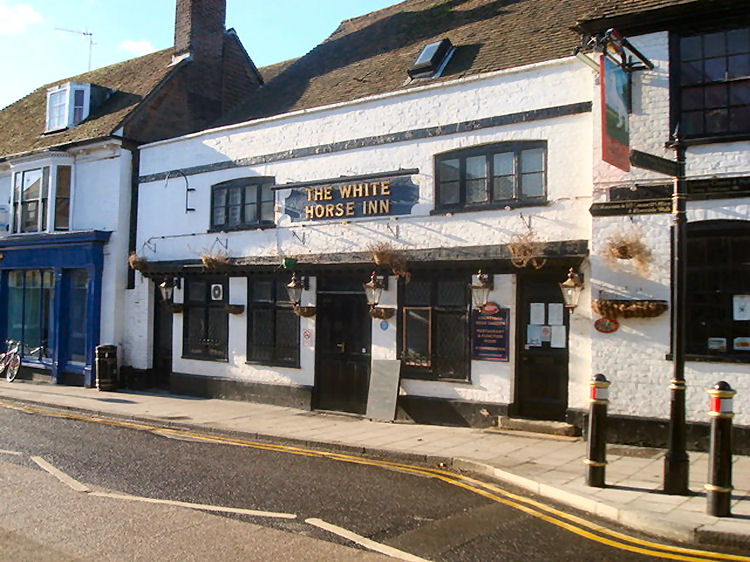
Above photo 2009 by Stacey Harris
Creative Commons Licence. |
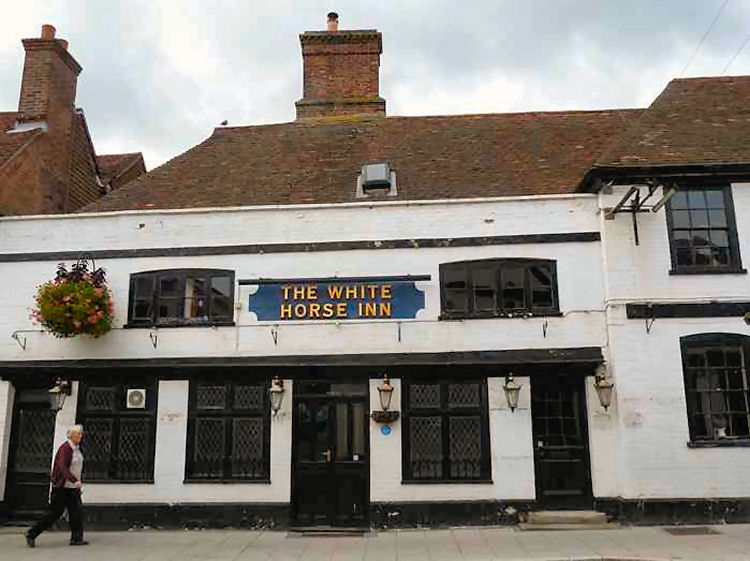
Above photo, September 2010. |
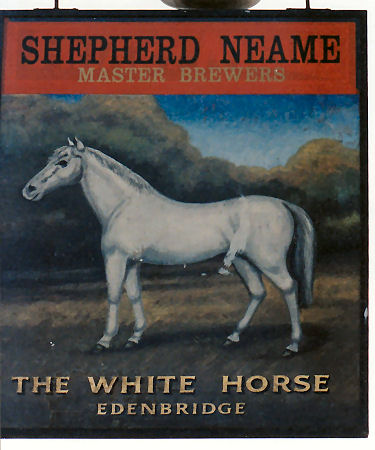
Sign above, June 1993.
With thanks from Brian Curtis
www.innsignsociety.com.
|
|
From the Maidstone Journal. 16 October, 1841.
November 2nd. Detained at the "White Horse" in Edenbridge on suspicion
of being stolen, an 8 Day Dial, in mahogany case; if not legally claimed
in 28 days after this notice the same will be sold to pay the expense of
advertising etc. If by letter, prepaid, to Mr, West, "White Horse Inn"
Edenbridge or to Mr. A. Corke, constable of the same place.
|
|
Kentish Gazette, 3 February 1852.
Edenbridge. Melancholy Death.
An inquest was held at the "White Horse Inn," on Thursday, on the body
of Mr. James Golding, who was found drowned in a mote, near his
residence, on Tuesday morning, the 20th instant; the deceased has for
many years been in the employ of T. Alexander, Esq., as bailiff, and was
much respected. The jury, after hearing the witnesses, returned a
verdict of "Found Drowned." The deceased was 42 years of age, and has
left a wife and large family.
|
|
Southeastern Gazette, 5 July 1853.
Mary Welch, 43, for stealing a table-cloth, the property of Stephen
Burbary, at Westerham.
The prosecutor is landlord of the "Grassshopper" public-house and
the cloth was used in his tap-room on the 5th May, on which day the
prisoner was at his house. On the 6th the prisoner offered the cloth
for sale at the "White Horse," Edenbridge, for 4d., and it was
purchased by the ostler, who, suspecting it to be stolen property,
gave information to Superintendent Handley, gave the cloth up to
him, and the prisoner was taken into custody. Prisoner said she
bought the cloth of a man named Smith, who had formerly lodged at
prosecutor’s house. Previous convictions of felony were proved
against her, and she was sentenced to fifteen years’ transportation.
|
|
Kentish Gazette, 17 March 1857.
GREGORY v. MILLS
This was an interpleader action to try the right to certain goods
now in the possession of the plaintiff
It appeared from the opening of counsel that a man named West had
kept for some years the "White Horse," at Edenbridge, and having
become very much in arrears for rent, owing no less than £295 for
rent and £37 for goods to his landlord, Messrs. Day, brewers, they
put in a distress. At this time, Gregory, the preset plaintiff, and
formerly a waiter at the "Bull Inn," Dartford applied to Messrs. Day
in February last, and asked whether they had a public-house to
dispose of, as he was anxious to purchase one. They told him they
had the "White Horse" at Edenbridge, and he deposited £50 before he
went to look at it. Gregory offered to purchase the goods from
Crafter, the officer in charge. The inventory of the goods and a
receipt for £269 4s. for them was put in. West was told to give up
the premises to Gregory, which he did, and Gregory took possession
of the house and the goods in the inventory. Gregory has continued
to keep the house ever since. West had a wife and daughter, and
Gregory kept the daughter in his service. West has had nothing to do
with the business since Gregory bought these goods. Mr. Mills, a
creditor of West, put in an execution on the 14th of February.
Mr. Jeremiah Crafter, an auctioneer and appraiser, of London,
received a warrant to distrain, and went on the 3rd of February to
Edenbridge to the "White Horse," and levied the distress. He then
made a regular valuation of the whole of the fixtures and furniture.
Mr. West then signed such documents as he thought necessary.
Cross-examined.:— There was an understanding that Gregory was to go
out at the end of three months at a valuation if he did not approve
of it.
Mr. West said he had kept the "White Horse" for some years, and had
never known Gregory until the day he came down. When Mr. Crafter
went away Gregory remained there and took possession.
Cross-examined by Mr. James.:— Witness owed Mills, the defendant, a
balance of £50. Owed £295 for rent. At the time Gregory came in,
Mills was pressing for the money.
On the 7th February witness offered 2s. 6d. in the pound, but had
paid nothing, as this had taken all he had.
Mr. James, at the conclusion of plaintiff’s case, submitted to his
Lordship that it was a suspicious transaction.
The Judge.:— No; the landlord had a right to secure himself. After
he had put in the distress he would take care to leave nothing for
the execution; and if he thought an execution was coming, he would
be the more likely to act promptly.
Verdict for plaintiff; less certain of the goods which were admitted
to belong to a third party.
|
|
Kent Times, 15 February 1862.
THE LATE CASE OF NEGLECT. THE INQUEST.
An inquest was held at the "White Horse Inn" yesterday (Friday) on
the body of Elizabeth Goldsmith (the particulars of whose death will
be found in another column). A highly-respectably jury was sworn, of
which Mr. C. O. Evans was foreman.
William Goldsmith, the husband of the deceased, detailed the facts
of the case as stated by us in another portion of this day's Kent
Times, and in the course of his evidence was asked by Mr. Geere, the
surgeon, if he (witness) did not distinctly tell him (Mr. G.) he
could not pay him, to which the witness replied, "I told you I would
sell anything off my back to pay you, but you would not come."
Anne Jeffrey said:- I attended the deceased on Tuesday evening, she
sent for me, and I found her very near her confinement. I have had
13 children of my own, and have successfully attended several women
in their confinement. I did the best I could for the deceased, but I
was anxious for Mr. Geere to come, as I apprehended there was
danger. He came and did what he could. I believe if a medical man
had been there earlier her life would have been spared. I cannot say
such would have been the case; when I first sent for Mr. Geere I was
not apprehensive of danger.
By Mr. Evans:- Was not the deceased a woman of weak constitution and
had she not been very badly fed?
Witness:- yes, she had been living on bread and swedes.
Ann Heaysman and Ann Charlton gave similar evidence, the latter
stating that she had been with deceased during 6 out of 8 of her
confinements and that she was quite as well in this case as usual.
This witness also said she believed if medical attendance had been
available everything would have gone well.
John Wallis, Relieving Officer, was then called, but he objected to
being sworn, stating that he had not been summoned; he was reminded
that Mr. Weaire had ordered him to be there in his capacity of
Parish Constable, the police officer having gone to meet the
coroner. He then asked what he was to be sworn for, and the coroner
told him "to speak the truth and answer any questions the jury
thought it their duty to put to him, for the purpose of eliciting
the truth: if he refused, the jury and the public would certainly
draw unpleasant inferences from his refusal." He was then sworn, and
stated that he was asked for an order by the witness Goldsmith, that
he laid the matter before the Board, and the application was refused
on the ground that Goldsmith was able to support himself and family:
that Goldsmith told him he was earning fourteen shillings per week
and one of his boys five shillings, that he again saw Goldsmith the
next week and told him the order was refused. Goldsmith then said,
"I want an order for my wife, and if they do not give me one, I’m
d----d if I don't take all my family into the workhouse:" that
witness saw no more of him until last Tuesday, when he came again
and applied for an order, as his wife was in labour; that witness
gave him one by way of loan for him to repay, and that he left
witness within ten minutes from the time he came to witness’s house
(Mr. Weaire here asked if it was usual to require repayment in such
eases, as it was evident to the jury, who had been into Goldsmith’s
house, that he was in the most abject poverty. Witness stated that
it was usual to require a bond for repayment, but in this case the
money would not have to be repaid).
Goldsmith was recalled, and said he had told Walliss that his
earnings were 12s. per week, occasionally 14s. in the summer, and
that the 5s. his boy earned was left to pay the landlord (Mr.
Alexander, for whom the boy worked, some back rent.
Mr. Geere stated that when Goldsmith came to him with the order, he
was just going to Four Elms, to a ease of confinement, but that he
got back as soon as he could, and he had seen Mr. Young, one of the
guardians during the evening, who said the woman should not suffer,
whether her husband got an order or not; witness was obliged to go
to Four Elms, but was not gone more than three-quarters-of-an-hour —
the cause of death was excessive haemorrhage.
At this stage of the proceedings the Coroner very carefully summed
up the evidence, and the room was then cleared for the jury to
consider their verdict.
In a very short time the following verdict was agreed to:- That the
deceased died in child-birth from want of medical attendance, and
the Jury think Goldsmith’s application and distress were not
properly represented to the Board by the Relieving-officer, Wallis."
Each of the jury gave the poor man, Goldsmith, one shilling, and
several other gentlemen in the room did the same.
[We shall certainly return to this matter next week. In the meantime
it would be well to consider whether the above verdict does not, in
law, amount to one of Manslaughter against Messrs. Geere and Wallis,
Ed. K.T.]
|
|
From the Kentish Gazette, 13 June 1865.
EDENBRIDGE. A Carter Killed in Trying to Stop his
Team.
On Tuesday, the 6th inst., an inquest was held at the "White
Horse Inn," Edenbridge, by J. T. N. Dudlow, Esq., the coroner for
West Kent, upon the body of Henry Head, who met, his death on
Saturday, the 3rd instant, by being run over by a waggon loaded with
bop poles.
Mr. S. Leigh stated that on Saturday afternoon he heard a team of
horses come round the Pound-lane rather sharply, and as they passed
his yard he saw that they still kept getting faster; he saw the man
endeavour to stop them with his whip. Very shortly the fore horse
struck into a gallop; the man then tried to get hold of the next to
the hindermost horse, and he saw him fall and the near side wheels
run over his body. He ran to the spot and found the man lying on his
face; he picked him up; he did not move but fetched his breath two
or three times and then died.
Thomas Pocknell stated that Henry Head was not the regular carter
to the team, but being young horses, Mr. Moven sent him instead of a
boy. The regular carter stopped behind to give some orders to the
blacksmith, and the man Head took the whip and drove the team
through the town of Edenbridge. He was with another waggon some
distance behind. He saw them turn the corner of Pound-lane, but did
not see the accident occur. He did not stop to see Head, as he was
in the care of Mr. Leigh and others, and he ran after the team, but
they were stopped before he got to them. The horses were young ones;
they were not by any means vicious. He thought it must be the rattle
of the poles in turning the lane which started the horses; the man
had been used to horses all his lifetime.
Mr. Geere, surgeon, stated that he was from home when the
accident occurred. As soon as he got home he examined the body and
found the chest completely crushed.
His death must have been instantaneous; had it been a narrow
wheel waggon instead of a broad, it must have cut him asunder.
After a few words from the coroner, the jury returned a verdict
of "Accidental death."
|
|
|
I am informed that this is now (2017) a Costa Coffee shop.
LICENSEE LIST
TAYLOR William 1828+

LEIGH John 1832+

WEST James 1841-57+ (age 32 in 1841 ) )
GREGORY Henry 1861-74 (age 47 in 1871 ) )
ROBERTSON Alexander 1881-82+ (age 36 in 1881 ) )
GLOVER Amin 1891+ (also farmer age 34 in 1891 ) )
PANISFFER G 1901 (age 42 in 1901 ) )
FRENCH Horace 1913-38+
https://pubwiki.co.uk/WhiteHorse.shtml
http://www.closedpubs.co.uk/whitehorse.html
 From the Pigot's Directory 1828-29 From the Pigot's Directory 1828-29
 From the Pigot's Directory 1832-33-34 From the Pigot's Directory 1832-33-34
 Census Census
|






